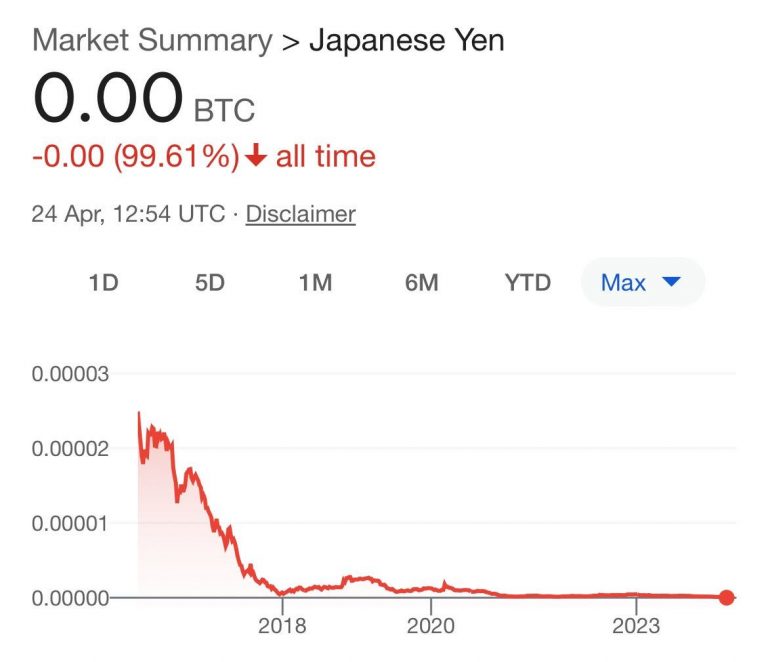
In the dynamic world of currency exchange, the relationship between traditional fiat currencies and cryptocurrencies has been a subject of much interest and speculation. The Japanese Yen (JPY), one of the world’s most traded currencies, and Bitcoin (BTC), the first and most well-known cryptocurrency, are no exception to this trend.
The claim that the Japanese Yen has “gone to zero” against Bitcoin is a hyperbolic statement that does not reflect the actual exchange rates and market dynamics. As of the latest data, 1 Bitcoin is equivalent to approximately ¥10,221,181. This exchange rate is subject to fluctuations due to market forces, including supply and demand, investor sentiment, and broader economic factors.
The valuation of Bitcoin in terms of the Japanese Yen has seen significant changes over time, influenced by various global events, technological advancements, and shifts in regulatory environments. Bitcoin’s decentralized nature and limited supply contrast with the Yen’s status as a legal tender backed by the Japanese government and its monetary policy.
Register for Tekedia Mini-MBA edition 19 (Feb 9 – May 2, 2026): big discounts for early bird.
Tekedia AI in Business Masterclass opens registrations.
Join Tekedia Capital Syndicate and co-invest in great global startups.
Register for Tekedia AI Lab: From Technical Design to Deployment (next edition begins Jan 24 2026).
It is important to understand that the value of Bitcoin against the Yen or any other fiat currency is not indicative of the latter’s collapse or failure. Instead, it represents the growing interest and adoption of cryptocurrencies as an asset class and a medium of exchange in certain contexts. The rise in Bitcoin’s value over the years has been remarkable, and it has sparked discussions about the future of money, the role of central banks, and the potential of blockchain technology.
One of the key aspects of Japan’s regulatory framework is the focus on user protection. This includes safeguarding user assets and providing sufficient information to users, ensuring that intermediaries such as custodial service providers maintain proper internal control systems. The FSA mandates that crypto exchanges in Japan be registered and comply with traditional anti-money laundering (AML) and counter-financing of terrorism (CFT) obligations, aligning with international standards set by the Financial Action Task Force (FATF).
The introduction of stablecoins pegged to the yen has also played a significant role in Japan’s cryptocurrency landscape. These digital assets, designed to minimize price volatility by being linked to a conventional asset class like fiat currency, have attracted more individuals and enterprises to the crypto arena. Notably, only banks, fund transfer service providers, and trust companies are entitled to issue digital-money type stablecoins in Japan, with stringent requirements to ensure redemption at par and price stabilization.
Japan’s regulatory approach is not without its challenges. The stability of the yen, for instance, has been a factor in restraining the explosive growth of cryptocurrencies within the country. Moreover, Japan’s shrinking and aging population presents another hurdle, as younger generations are more inclined to adopt crypto assets compared to older demographics.
Despite these challenges, Japan continues to embrace the potential of cryptocurrencies and blockchain technology. The government’s awarding of nonfungible tokens (NFTs) to mayors for their initiatives in 2022 marked a significant milestone, positioning Japan among the first national governments to utilize NFTs as a form of recognition.
Investors and enthusiasts alike are keenly observing the interplay between cryptocurrencies like Bitcoin and traditional currencies such as the Japanese Yen. While some view cryptocurrencies as a hedge against inflation and currency devaluation, others approach them with caution due to their volatility and regulatory uncertainties.
The relationship between the Japanese Yen and Bitcoin is complex and multifaceted. It is shaped by a myriad of factors that go beyond simple comparisons of exchange rates. As the financial landscape continues to evolve, the interaction between fiat currencies and cryptocurrencies will likely remain a topic of keen interest and ongoing analysis.



